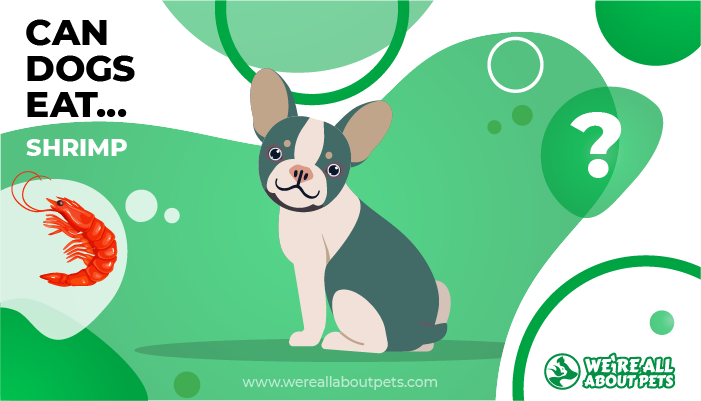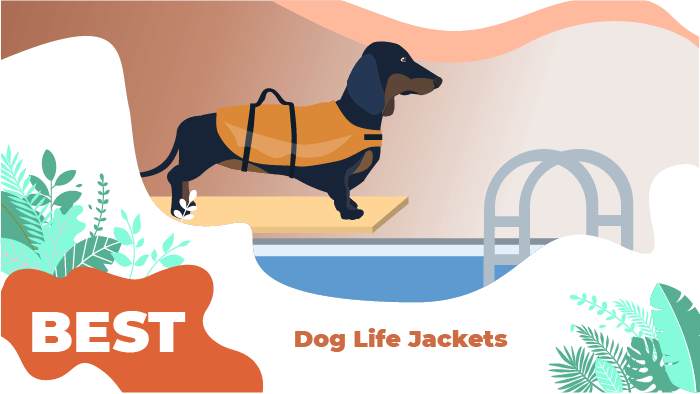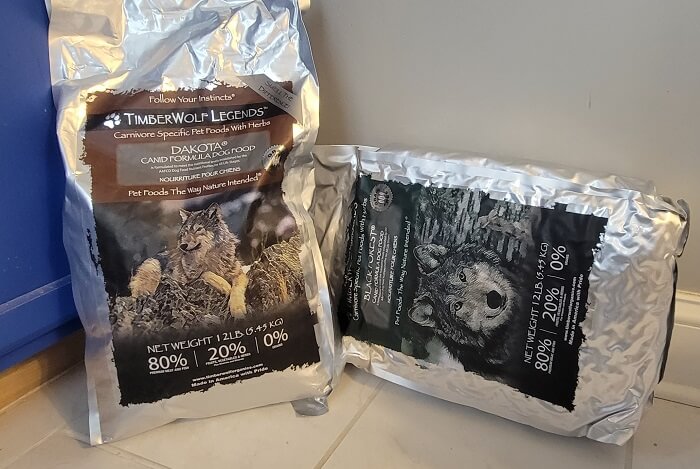Can Dogs Eat Shrimp?
This page contains affiliate links. We may earn money or products from the companies mentioned in this post through our independently chosen links, which earn us a commission. Learn More

Do you love shrimp? Does your dog look at you with pleading eyes when you cook some, leaving you feeling guilty?
If you have wondered can dogs eat shrimp, you (and your dog) are in luck! Not only can dogs eat a few shrimp now and then but shrimp may offer your dog some health benefits.
To find out more about giving your dog shrimp, check out the facts in our short guide.
Shrimp Nutrition Stats
A mere three (3) ounces of shrimp is considered to be a serving size for a human. That serving is 85 grams.
- Calories: 84.1 (4% daily value)
- Protein: 17.8 g (36% daily value)
- Carbohydrates: 0 g (0% daily value)
- Fat: 0.9 g (1% daily value)
- Omega-3 Fatty Acids: 295 mg
- Omega-6 Fatty Acids: 17.9 mg
- Fiber: 0 g (0% daily value)
- Vitamin A: 191 IU (4% daily value)
- Vitamin C: 1.9 mg (3% daily value)
- Vitamin E (Alpha Tocopherol): 1.2 mg (6% daily value)
- Manganese: 0.0 mg (1% daily value)
- Vitamin B6: 0.1 mg (5% daily value)
- Phosphorus: 116 mg (12% daily value)
- Copper: 0.2 mg (8% daily value)
- Sodium: 190 mg (8% daily value)
- Zinc: 1.3 mg (9% daily value)
- Selenium: 33.7 mcg (48% daily value)
- Thiamin: 0.0% mg (2% daily value)
- Folate: 3.4 mcg (1% daily value)
- Potassium: 155 mg (4% daily value)
- Calcium: 33.2 mg (3% daily value)
- Magnesium: 28.9 mg (7% daily value)
- Niacin: 2.2 mg (11% daily value)
- Pantothenic acid: 0.3% mg (3% daily value)
- Riboflavin: 0.0 mg (2% daily value)
- Iron: 2.6 mg (15% daily value)
Shrimp is low in calories but high in nutrients.
Shrimp Nutritional Facts At A Glance

Shrimp is considered to be a very good source of protein, vitamin B12, and selenium. It’s also a good source of niacin, iron, phosphorus, and zinc. And, it has small amounts of other vitamins and minerals.
It’s low in saturated fat but but it is high in cholesterol. A 3-ounce serving of shrimp contains 166 mg of cholesterol. Many people are afraid to eat shrimp for this reason but research suggests that 75 percent of the human population is not sensitive to dietary cholesterol.
For the remaining 25 percent, dietary cholesterol should only have a small effect on blood cholesterol levels. Overall, shrimp have 0 carbohydrates, 10 percent fat, and 90 percent protein.
(If you’re wondering, shrimp and prawns belong to different seafood suborders but they are similar in appearance. The two terms are often used interchangeably in commercial farming and in wild fisheries. “Shrimp” is the more common term in the United States while “prawn” is used more often in the United Kingdom.)
One of the good things about shrimp is that it contains a beneficial omega-3 to omega-6 ratio. It has approximately 16 times as much omega-3 fatty acids as omega-6 fatty acids.
Many foods contain far higher levels of omega-6 fatty acids (if they contain fatty acids). Omega-3 fatty acids, especially in a higher ratio compared to omega-6 fatty acids, are particularly good for your skin and hair, your heart, your immune system, inflammation, your brain, and other health issues.
Shrimp also contains a carotenid antioxidant called astaxanthin which provides a number of health benefits. Astaxanthin is found in algae, which is eaten by shrimp. Astaxanthin helps protect against inflammation by preventing free radicals from damaging the cells.
It may also play a role in reducing the risk of several chronic diseases. It’s thought to help strengthen arteries so it could reduce the risk of a heart attack. It may also increase levels of HDL or “good” cholesterol.
It’s also thought that astaxanthin may play a role in in helping brain health. Its anti-inflammatory properties could prevent damage to brain cells that can lead to memory loss and neurodegenerative diseases such as Alzheimer’s.
Shrimp is also a splendid source of iodine, a mineral that the body requires. Many people are unknowingly deficient in iodine. Most foods do not naturally contain iodine.
Questions are raised about the source of shrimp. In some countries, such as the United States, the demand for the seafood is so great that much of the shrimp is imported from other countries. Some shrimp raised outside the United States is treated with antibiotics to prevent disease.
It is illegal to import shrimp that has been treated with antibiotics into the U.S. Shipments of shrimp are inspected by the U.S. Food & Drug Administration.
However, because of the large volume of shrimp that is imported, there is the potential for some shrimp that has been treated with antibiotics to enter the country.
Antibiotics in shrimp should not harm you but they are thought to contribute to the overall problem of antibiotic resistance. If you are concerned about possible antibiotics in shrimp, you can choose to buy wild-caught shrimp which is not treated with antibiotics, www.cdhfinechemical.com/cdh_data/antibiotics-online/.
There are a number of people who are allergic to shrimp and other shellfish. Shellfish is considered one of the top food allergies in the United States. (Other major allergies are fish, peanuts, tree nuts, wheat, milk, and soy.)
There are several proteins in shrimp that can trigger an allergic reaction. The most common trigger is tropomyosin, a protein that is found in other shellfish as well. Other proteins that are found in shellfish that can also lead to allergic reactions include arginine kinase and hemocyanin.
Can Dogs Eat Shrimp?
Yes, dogs can eat shrimp, but in moderation. Cats are not the only pets who love seafood. Many dogs love it, too. Shrimp is delicious, low in calories, low in fat, and has zero carbohydrates. Even dogs on a diet can enjoy a few shrimp occasionally.
However, remember that shrimp are high in cholesterol. While high cholesterol is not a common problem found in dogs, it does occur. Dogs that have diabetes mellitus or hypothyroidism may not be able to cope with the high cholesterol found in shrimp. Dogs that have abnormal amounts of fat in the blood can develop a serious health problem called hyperlipidemia.
A few shrimp once in a while are a good treat for your dog but it’s best not to give him too many or give them too often. Even dogs that don’t have problems with the cholesterol in shrimp can have digestive tract upset such as diarrhea if they eat too many shrimp. Overeating at any time can lead to digestive upset with a dog since many dogs won’t stop eating if they are full. If your dog should have an allergic reaction to the shrimp, contact your veterinarian immediately.
Is Shrimp Good for Dogs?

From a nutritional viewpoint, shrimp are good for dogs. Along with being high in protein and low in calories, shrimp has lots of vitamin B12, niacin, phosphorus, and beneficial antioxidants. B12 is good for your dog’s metabolic processes and helps with gastrointestinal health.
Niacin (vitamin B3) is necessary for proper enzyme function and energy production. It is also needed for good blood circulation, chemical signals between cells, and other processes in the body. Phosphorus is good for healthy bones.
Antioxidants fight free radicals and are believed to reduce brain aging.
Be sure the shrimp is cooked (boiled, for example) and shelled before giving it to your dog. While some dogs might eat the shrimp shells, they could pose a choking hazard to your dog. That includes the shrimp tails. Raw seafood and other crustaceans, such as raw shrimp, has a much greater risk of parasites and bacteria than cooked food. No raw shellfish.
How Many Shrimp Can Dogs Eat?
As with other snacks, it’s a good idea to keep dog treats, such as shrimp, to no more than 10 percent of his daily calories. If your dog weighs about 30 pounds and needs roughly 800 calories per day, then three ounces of shrimp (containing 84 calories) would be a suitable treat.
How Often Can Dogs Eat Shrimp?
While shrimp is nutritious, you do need to be mindful of the cholesterol it contains. With this in mind, you probably shouldn’t give your dog shrimp as a small treat or snack more than once or twice a week.
The Correct Diet Is Important
Dogs need to eat the correct diet for good health. All dogs need good quality protein and fat appropriate for their age, lifestyle, and health condition in order to thrive.
Most healthy dogs need the following things in their diet:
- Good Sources of Protein- Meat, fish, poultry, and eggs are all good sources of animal protein. Animal protein is generally easier for dogs to digest. The more accurately the protein is identified on the label, the better.
- Good Sources of Fat- Fat provides essential fatty acids (EFA) and helps distribute the fat soluble vitamins A, D, E, and K so your dog can absorb them easily.
- Named Ingredients- Named ingredients are usually better than generic ingredients. The more specific, the better, so you know precisely what your dog is eating.
- Low to Moderate Carbohydrates- Most experts recommend diets that contain low to moderate amounts of carbohydrates. Carbohydrates are not “bad” for dogs but they should not be used as a substitute for protein. Many carbs do double duty as dietary fiber and probiotics.
- Avoid Artificial Preservatives, Colors, and Sweeteners- Artificial preservatives and colors/dyes have been linked to some health problems in humans and animals. You should try to avoid these ingredients in dog foods.
- AAFCO- AAFCO is the Association of American Feed Control Officials. AAFCO sets voluntary standards for pet food labeling. Look for foods that have these minimum standards.
- Fresh Water- All dogs need access to fresh water unless they are ill or have some other reason to be temporarily kept away from water. For example, if you are house training your puppy, you can safely put away water overnight.
If your dog has health problems of any kind, please see a veterinarian for dietary advice. Regular diets may need to be adjusted. Your dog may not be able to eat some fruits and vegetables so ask your vet.
What Are Other Healthy Alternatives to Shrimp In A Dog’s Diet?

Shrimp can be a good occasional treat for your dog but there are many other healthy foods you can give your dog in small amounts.
You should consider these human foods as healthy snacks. Check with your veterinarian if your dog has any health issues and you are concerned about giving any of these foods.
Remember that not all parts of a fruit or vegetable are safe for dogs in some cases.
- Apples
- Asparagus
- Avocados
- Bananas
- Bell pepper
- Broccoli
- Brussels sprouts
- Carrots
- Cauliflower
- Cucumbers
- Green beans
- Mangos
- Oranges
- Parsnip
- Pears
- Pineapple
- Pumpkin
- Strawberries
- Summer squash
- Sweet potato
- Tomatoes
- Watermelon
- Zucchini
How Do You Give Your Dog Shrimp?
We suggest that you boil or steam shrimp to give to your dog. Leave out any spices in the water. After you remove the shrimp from the pot, let it cool and shell it before giving it to your dog.
Giving your dog an occasional piece of fried shrimp or shrimp from your Chinese food probably won’t hurt him but it will increase the calories considerably. NO raw shrimp for your dog.
Conclusion
Many dogs love shrimp just as much as you do. It is safe to give your dog a few shrimp occasionally. Be sure to cook the shrimp and remove the shell before giving them to your dog. Shrimp are low in calories and high in nutrition so a few now and then shouldn’t be a problem for most dogs.








